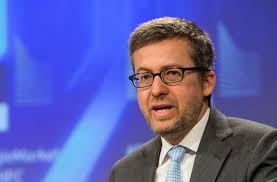Pro-Vice-Provost’s View
By Paul Ayris, on 13 June 2019
Visit of Carlos Moedas, European Commissioner for Research, Science and Innovation
On Thursday 13 June 2019, the EU Commissioner for Research, Science and Innovation, Carlos Moedas, visited UCL with members of his cabinet.
The purpose of the Commissioner’s presence was to re-visit those European universities to which he feels especial affinity. He leaves his position in the autumn of 2019 once the new European Commission takes office.
As Pro-Vice-Provost with a responsibility for co-ordinating Open Science across UCL, I was asked to address him in the Provost’s Office to outline the success that UCL has had in introducing Open Science practice across the institution. I also highlighted the challenges in Europe in moving to embrace Open Science principles. This is the text which I used in my talk, sitting next to the Commissioner as I spoke.
Successes
- UCL Press is the UK’s first fully OA University Press. We have published 106 monographs with over 2 million downloads – when conventional sales over the bookshop counter might result in 200 sales per title. Our most downloaded book is from Professor Danny Miller in Anthropology in UCL, How the World Changed Social Media, which has been downloaded over 300,000 times. This shows the transformative effect of OA monograph publishing.
- We have also launched a megajournal platform – with the first subject section being the Environment. This has Open Peer review and the submission is made available immediately as Green OA in a Pre-Print repository prior to peer review and final publication.
- We have just launched our Open UCL Research Data repository for academics to archive their research data for sharing and re-use.
- UCL Discovery is the institutional OA repository. We monitor OA compliance from the Faculties on a monthly basis and have compliance rates as high as 90%. UCL Discovery has just passed the 20 million download mark.
- From 2000-2016, Digital Science has shown that UCL is consistently the university in the Russell Group in the UK most engaged with OA.
- We have also launched a pilot Open Educational Resources repository to collect educational materials for sharing and re-use.
- We have a pan-UCL Open Science governance platform, which monitors the introduction of Open Science principles and practices across the institution; and we lead work in Open Science in LERU (League of European Research Universities).
- UCL is one of the first universities anywhere in Europe to include Open Access to publications, research data and software, as a core principle in our academic promotions framework. This policy was signed off and published in 2018.
Challenges and how UCL can help
- Academic concerns with Plan S, not with Open Access, threaten to de-rail the advances made across Europe in Open Science practice. We would like to support Plan S by working with the Commission and others to make Alternative Publishing Platforms, on the model of UCL Press, a reality across Europe.
- Those who manage the European Open Science Cloud have not engaged with universities, indeed they ignore my calls for collaboration. UCL would like to work with the EOSC to determine rules of engagement for universities. We have considerable experience, running the DART-Europe portal for OA research theses, which aggregates metadata for 619 universities and provides access to over 800,000 full-text research theses in 28 countries.
- The Commission’s Open Science Policy Platform work on Next Generation Metrics is badly stalled and needs a kick for it to produce a set of Recommendations which can be embraced by the global academy. UCL could help as we are out to informal consultation on an institutional Bibliometrics policy, grounded in Open Science principles.
- UCL is attempting, with LERU and other partners, to build a pan-European community for Open Science; the Commission could help by providing opportunities for seed funding to encourage growth in community engagement. Open Science, after all, is about people not just principles and practice.
I gave the Commissioner a gift bag from UCL Press containing, amongst other things, a copy of Danny Miller’s How the World Changed Social Media, the most downloaded book from UCL Press. The Commissioner has asked me to follow up with him and his team on a number of the issues I raised. I will certainly be doing that.
Paul Ayris
Pro-Vice-Provost (UCL Library Services)
 Close
Close


